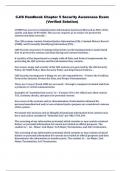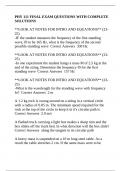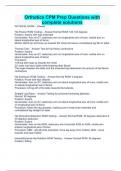Functionalist perspective - education
(consensus theory 1/3)
-links between educations and other institutions
-important agency of socialisation
-maintain social stability through value consensus, social cohesion e.c.t.
provides: -secondary socialisation
-help for people to gain work
Durkheim & Parsons identified 4 basic functions of education:
1) Passing on society’s culture and building social solidarity
-Education meets a functional prerequisite through this. Builds social solidarity & value consensus
-achieved through overt and hidden curriculum (e.g. Citizenship)
2) Bridge between family and advanced society
-Durkheim says that school is a microcosm of society. (prepares)
-Parsons sees school as vital for secondary socialisation
argues school provides bridge between particularistic values (&ascribed status of family) and
universalistic values (&achieved status of society)
-e.g. child ascribed status in family, judged by particularistic values
-e.g. adult in society meritocracy, achieved status, same universalistic values
(Pre-industrial era) Mechanical solidarity
(Modern era) Organic solidarity
3) Developing human capital
-Schultz (1971) theory of human capital (investment in education = good for economy)
expansion of schooling/high education/trained/flexible
-to undertake wide range of jobs in division of labour.
4) Selecting people for roles in society & justifying inequality
-Davis and Moore selecting/sifting people through the job market
most talent/qualification = best job
-Grading people role allocation
-Meritocratic society jobs/wealth/power depend on education
-Equality of educational opportunity
-wealthy/poor is your fault
,Functionalist view Criticism
-Education passes culture from one gen to the next, shared Marxists ignores inequality in power, no value consensus.
norms and values. Norms and values from dominant class.
Provides ‘social glue’. Feminists school passes patriarchal views, disadvantages
girls.
-Education provides bridge between particularistic values Doubt how far contemp society is based on universalistic
(&ascribed status of family) and universalistic values values and achieved status. Upper class inherit wealth and
(&achieved status of wider society) elite jobs.
-Education provides a trained and qualified labour force Weak link between qualification and pay.
Learnt in class little to do with actual job
Effective role selection and allocation. Grades do not lead you on one path. Ethnicity, social class
e.c.t have a major influence.
Education legitimises social inequality. Bowles and Gintis (2011 [1976]) education system disguise
the fact there is no equal opportunity. Social
class/ethnicity/gender.
, New right perspective - education
(consensus theory 2/3)
-emerged 1979 Thatcher’s government. (agenda for privatisation)
-Murray, New right academic concerned with underclass.
Key ideas
-Gov can’t meet people’s needs
-Education reform act (1988) under Thatcher marketisation of schools
Chubb and Moe (1990) schools need to be run more like businesses for great competition.
consumers (parents) have choice.
-David (1933) described marketised education as ‘parentocracy’ (parents have choice though ofsted
reports and league tables)
-Schools given more power (control £££) opt out of Local education authority (LEA).
-Open enrolment, more students = more £££
-Teach students ready for work, support economic growth.
-State (National Curriculum) same shared values
Similar to functionalist view Different to functionalist view
-Agrees with selection function, more talented given -Education is not fulfilling the economic function, not
better jobs. enough school leavers success.
-Agrees with socialisation function, pass shared values -State cannot run education system to meet needs of
for common culture everyone.
-Education system should be based on meritocracy -More competition is needed to increase standards.
and competition.
Criticisms
-Ball argues ‘myth of parentocracry’, £££ is an external force that may stop
only middle class benefit.
-Marketisation creates a ‘two-tier’ state education system
bad results = less people = less money (struggle to improve)
-National curriculum being ethnocentric.
-fails to recognise individual negative experiences
(consensus theory 1/3)
-links between educations and other institutions
-important agency of socialisation
-maintain social stability through value consensus, social cohesion e.c.t.
provides: -secondary socialisation
-help for people to gain work
Durkheim & Parsons identified 4 basic functions of education:
1) Passing on society’s culture and building social solidarity
-Education meets a functional prerequisite through this. Builds social solidarity & value consensus
-achieved through overt and hidden curriculum (e.g. Citizenship)
2) Bridge between family and advanced society
-Durkheim says that school is a microcosm of society. (prepares)
-Parsons sees school as vital for secondary socialisation
argues school provides bridge between particularistic values (&ascribed status of family) and
universalistic values (&achieved status of society)
-e.g. child ascribed status in family, judged by particularistic values
-e.g. adult in society meritocracy, achieved status, same universalistic values
(Pre-industrial era) Mechanical solidarity
(Modern era) Organic solidarity
3) Developing human capital
-Schultz (1971) theory of human capital (investment in education = good for economy)
expansion of schooling/high education/trained/flexible
-to undertake wide range of jobs in division of labour.
4) Selecting people for roles in society & justifying inequality
-Davis and Moore selecting/sifting people through the job market
most talent/qualification = best job
-Grading people role allocation
-Meritocratic society jobs/wealth/power depend on education
-Equality of educational opportunity
-wealthy/poor is your fault
,Functionalist view Criticism
-Education passes culture from one gen to the next, shared Marxists ignores inequality in power, no value consensus.
norms and values. Norms and values from dominant class.
Provides ‘social glue’. Feminists school passes patriarchal views, disadvantages
girls.
-Education provides bridge between particularistic values Doubt how far contemp society is based on universalistic
(&ascribed status of family) and universalistic values values and achieved status. Upper class inherit wealth and
(&achieved status of wider society) elite jobs.
-Education provides a trained and qualified labour force Weak link between qualification and pay.
Learnt in class little to do with actual job
Effective role selection and allocation. Grades do not lead you on one path. Ethnicity, social class
e.c.t have a major influence.
Education legitimises social inequality. Bowles and Gintis (2011 [1976]) education system disguise
the fact there is no equal opportunity. Social
class/ethnicity/gender.
, New right perspective - education
(consensus theory 2/3)
-emerged 1979 Thatcher’s government. (agenda for privatisation)
-Murray, New right academic concerned with underclass.
Key ideas
-Gov can’t meet people’s needs
-Education reform act (1988) under Thatcher marketisation of schools
Chubb and Moe (1990) schools need to be run more like businesses for great competition.
consumers (parents) have choice.
-David (1933) described marketised education as ‘parentocracy’ (parents have choice though ofsted
reports and league tables)
-Schools given more power (control £££) opt out of Local education authority (LEA).
-Open enrolment, more students = more £££
-Teach students ready for work, support economic growth.
-State (National Curriculum) same shared values
Similar to functionalist view Different to functionalist view
-Agrees with selection function, more talented given -Education is not fulfilling the economic function, not
better jobs. enough school leavers success.
-Agrees with socialisation function, pass shared values -State cannot run education system to meet needs of
for common culture everyone.
-Education system should be based on meritocracy -More competition is needed to increase standards.
and competition.
Criticisms
-Ball argues ‘myth of parentocracry’, £££ is an external force that may stop
only middle class benefit.
-Marketisation creates a ‘two-tier’ state education system
bad results = less people = less money (struggle to improve)
-National curriculum being ethnocentric.
-fails to recognise individual negative experiences











